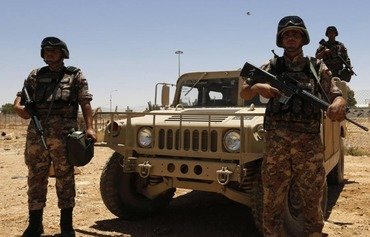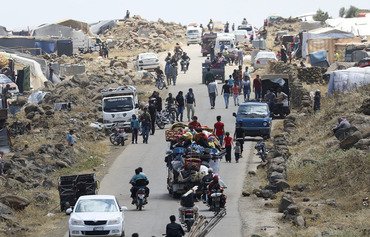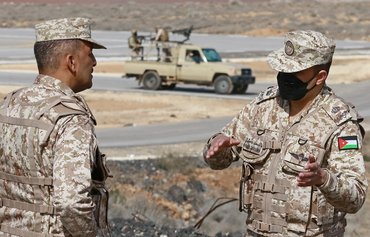Since the outbreak of the Syrian crisis in 2011, Jordan has been deeply affected by the situation on the other side of its northern border, and has played a leading humanitarian role in helping its neighbours.
The kingdom, which says it is hosting close to 1.3 million Syrian refugees at a cost of more than $10 billion, last month said it would be unable to host a new wave of refugees due to the strain on its financial resources and infrastructure.
Jordan said its borders will remain closed and that it cannot absorb any more refugees, calling on the UN to "secure the residents in their own country".
Minister of State for Media Affairs Jumana Ghanimat made it clear, however, that "Jordan has not and will not abandon its humanitarian role".
![A general view taken from Jordan's Mafraq governate on July 7th shows the Jaber border crossing a day after the Syrian regime retook the Syrian side of the crossing, known as Nassib. [Khalil Mazraawi/AFP]](/cnmi_am/images/2018/07/24/13573-Jordan-Syria-border-600_384.jpg)
A general view taken from Jordan's Mafraq governate on July 7th shows the Jaber border crossing a day after the Syrian regime retook the Syrian side of the crossing, known as Nassib. [Khalil Mazraawi/AFP]
![A picture taken on June 30th from the northern Jordanian city of Ramtha shows pillars of smoke rising across the border from Syrian regime shelling in the Daraa countryside. [Khalil Mazraawi/AFP]](/cnmi_am/images/2018/07/24/13574-Jordan-border-Daraa-600_384.jpg)
A picture taken on June 30th from the northern Jordanian city of Ramtha shows pillars of smoke rising across the border from Syrian regime shelling in the Daraa countryside. [Khalil Mazraawi/AFP]
Despite the closure of the border, Jordan and its people, particularly those in the kingdom's north, rushed to aid displaced Syrians sheltering near the border in Daraa province in co-operation with the UN and humanitarian organisations.
"The Jordanian armed forces have begun dispatching humanitarian aid convoys to our Syrian brethren affected by the situation inside Syria," Ghanimat said.
Deep ties with the Syrian people
Jordan’s "deep ties with Syria in all fields often compel it to act and engage in humanitarian efforts", said Saud al-Sharafat, founder and director of Al-Shorufat Centre for Globalisation and Terrorism Studies.
Many Jordanians have cross-border tribal and family ties, he said, "as well as kinships and friendships by virtue of their common geopolitical, geo-social and geo-economic [connections], and this reality is clear from their history".
While the kingdom has been clear it will not open its borders to receive refugees, it has been able to help alleviate the suffering of civilians who flocked to the border area, he said.
Jordan's decision not to open its border crossing with Syria during the regime's Daraa operation was to prevent new waves of refugees from inundating the kingdom, said security expert and researcher Omar al-Raddad.
The kingdom does not have the capacity to host more Syrian refugees than it currently accommodates, he told Al-Mashareq, noting that the international community has only provided funds sufficient to meet 40% of their needs.
Jordan also has concerns about its national security, he said, due to the potential infiltration of extremists among the refugees.
Al-Raddad praised Jordan’s role on the grassroots and official levels, and the efforts it has made to provide relief to the displaced inside Syria by passing medical and food aid over the fence and dispatching 40 convoys of supplies.
Many roles of the Jordanian army
"Since the outbreak of the crisis in Syria, the Jordanian army has played a variety of roles that transcend the military roles assigned to it," al-Sharafat said.
In addition to its regular duties, the army has had to play a role generally carried out by humanitarian organisations, he said.
Carrying out humanitarian activities in areas near the border has exposed soldiers to the dangers posed by groups such as the "Islamic State of Iraq and Syria" (ISIS), he added.
Jordanian military institutions have shown unprecedented expediency in dealing with the crisis in Daraa as well as protecting the kingdom's borders, performing both security and humanitarian roles, al-Raddad said.
More than 60 military factions, including the Tahrir al-Sham alliance and ISIS-affiliated Jaish Khalid ibn al-Walid, are present across the border, he noted.
Given "the strong possibility of infiltration by some of their elements among the refugees", the Jordanian forces have to deal with the refugee issue with "extreme caution", he added.
Jordanian forces have been the target of terror attacks in al-Rukban camp and the General Intelligence Directorate in al-Baqaa and in al-Karak in southern Jordan, he said, all of which are repercussions of the Syrian crisis.
Jordan's role in Syria diplomacy
Jordan, with the US and Russia, has contributed to the creation of de-escalation zones in southern Syria.
Al-Raddad said he believes the recent talks Jordan held with Russia over the fighting in Daraa relate to the negotiations being conducted between the Syrian regime and moderate opposition factions.
The talks seek to ensure reconciliation is achieved with conditions that are less severe than those presented by the Syrian regime, which essentially amount to unconditional surrender by those factions, he said.
Moderate opposition factions are expressing concerns about retaliatory acts by the Syrian regime when the fighting stops, he said.
Dialogue also will look at how to avert the threat represented by ISIS and Tahrir al-Sham, he said, and will look at the situation in Syria after Daraa in the context of a political settlement of the Syrian issue.
This would include a transition stage with a new constitution to be discussed by the Syrian regime and opposition, in dialogue held under the auspices of the UN.

![Displaced Syrians from Daraa province gather to receive aid food in a makeshift camp near the Jordanian border and the town of Nassib, southern Syria, on July 2nd. [Mohamad Abazeed/AFP]](/cnmi_am/images/2018/07/24/13575-Syria-border-relief-600_384.jpg)






